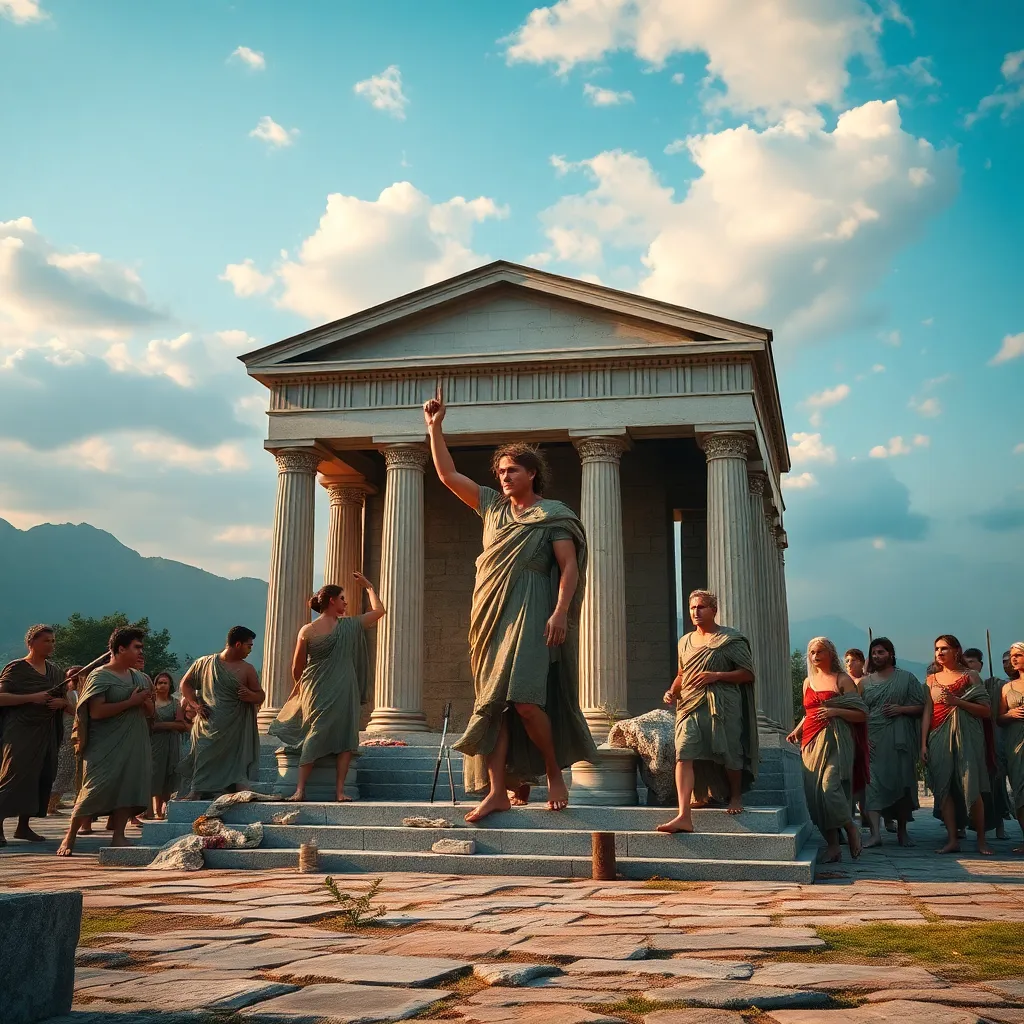The Role of Rituals and Ceremonies in Honoring Greek Heroes
I. Introduction
Rituals and ceremonies played a crucial role in ancient Greek culture, serving as vital expressions of religious and social life. Defined as structured sequences of actions performed for a specific purpose, these rituals often involved symbolic acts that connected the community with the divine and the heroic. In ancient Greece, honoring heroes was not merely an act of remembrance but a fundamental aspect of cultural identity and religious observance.
The importance of honoring heroes in Greek culture is deeply rooted in the belief that these figures were intermediaries between the gods and humanity. Heroes, often possessing extraordinary abilities or virtues, were celebrated and revered through various rituals and ceremonies. This article will explore the various ways in which ancient Greeks honored their heroes, focusing on the historical context, types of rituals, sacred spaces, offerings, community impact, and the evolution of these practices over time.
II. Historical Context of Greek Heroes
The concept of heroism in Greek mythology and society held significant weight, encapsulating ideals such as bravery, strength, and moral integrity. Greek heroes were often depicted as larger-than-life figures who faced immense challenges, ultimately embodying the virtues that the Greeks admired. Their stories were not only entertaining but also served to teach moral lessons and cultural values.
Prominent Greek heroes include:
- Achilles: The central character in Homer’s “Iliad,” known for his unmatched prowess in battle and his tragic fate.
- Heracles (Hercules): Famous for his twelve labors, symbolizing the struggle against adversity and the quest for redemption.
- Theseus: Renowned for his intelligence and bravery, especially in his battle with the Minotaur.
The intersection of mythology and historical figures further enriched the concept of heroism. Many heroes were believed to have historical counterparts, blurring the lines between myth and reality, and reinforcing the significance of their legacy in Greek society.
III. Types of Rituals and Ceremonies
Rituals and ceremonies honoring Greek heroes varied widely, encompassing a range of practices that reflected the diverse beliefs and traditions of the time. Major categories of these rituals include:
- Funeral rites and commemorative practices: These were held to honor deceased heroes, often involving elaborate burial ceremonies, offerings, and the recitation of their deeds.
- Festivals and public celebrations: Events such as the Panathenaea, held in Athens, celebrated the goddess Athena and featured processions, sacrifices, and athletic competitions in honor of local heroes.
- Athletic competitions: The Olympic Games, held in Olympia, were not only a showcase of physical prowess but also served to honor heroes like Heracles, with winners often being celebrated as local heroes themselves.
IV. The Role of Temples and Sacred Spaces
Temples dedicated to heroes were integral to the practice of hero worship in ancient Greece. These sacred spaces served as focal points for rituals and ceremonies, allowing the community to pay homage to their heroes. The significance of these temples is evident in their architectural features and the cultural practices associated with them.
Key aspects include:
- Architectural features: Temples often featured altars, statues, and inscriptions that celebrated the deeds of heroes, marking their importance in both religious and civic life.
- Pilgrimages: Many Greeks undertook pilgrimages to these sacred sites, believing that visiting the temples would bring them closer to the divine and honor the memory of the heroes.
V. Offerings and Sacrifices
Offerings and sacrifices were central components of the rituals honoring Greek heroes. These acts of devotion were believed to appease the spirits of the heroes and seek their favor.
Types of offerings included:
- Animal sacrifices: Livestock such as sheep, goats, and bulls were commonly sacrificed at altars.
- Libations: Liquid offerings, typically wine or oil, were poured out in honor of heroes.
The symbolism behind these offerings was profound, representing gratitude, respect, and a desire for the heroes’ blessings. Priests and priestesses played a crucial role in these ceremonies, overseeing the rituals and ensuring that they were conducted according to tradition.
VI. The Impact of Rituals on Community Identity
Rituals and ceremonies served to strengthen social cohesion within Greek communities. Through shared participation in these practices, individuals forged connections with one another and with their cultural heritage.
Moreover, rituals were instrumental in teaching values and ethics, as they often conveyed moral lessons drawn from the lives of heroes. Key impacts include:
- Strengthening social cohesion: Festivals and communal rituals fostered a sense of belonging and collective identity.
- Teaching values: The stories of heroes imparted essential lessons about courage, loyalty, and honor.
- Reinforcing cultural heritage: Through the observance of rituals, communities preserved their traditions and passed them down through generations.
VII. The Evolution of Rituals Over Time
Over centuries, the rituals honoring Greek heroes evolved significantly, influenced by historical events, cultural shifts, and changing religious beliefs. Ancient practices gradually transformed, reflecting the dynamic nature of Greek society.
Changes included:
- Adoption of new deities: As Greek religion evolved, new gods and heroes emerged, altering the focus of certain rituals.
- Influence of historical events: Wars, conquests, and political changes impacted how heroes were commemorated, with some figures gaining prominence while others faded into obscurity.
- Contemporary relevance: Although some ancient rituals have diminished, the legacy of hero worship continues in modern Greek culture, showcasing the enduring significance of these practices.
VIII. Conclusion
In summary, the rituals and ceremonies honoring Greek heroes played a vital role in the cultural and religious life of ancient Greece. These practices not only celebrated the extraordinary deeds of heroes but also reinforced community bonds, imparted ethical lessons, and preserved cultural identity. The enduring legacy of these rituals serves as a testament to the importance of hero worship in Greek heritage.
As we reflect on the significance of these ancient practices, it is essential to appreciate and preserve the cultural heritage associated with them, ensuring that the stories of Greek heroes continue to inspire future generations.




